|
FAQs on Betta
Diseases/Health 39
Related Articles:
Anabantoids/Gouramis &
Relatives, Betta
splendens/Siamese Fighting Fish,
Betta Systems,
Betta Diseases,
Improved
(Better?) Products for Bettas!,
Related FAQs:
Betta Disease 1,
Betta Disease 2,
Betta Disease 3,
Betta Disease 4,
Betta Disease 5,
Betta Disease 6,
Betta Disease 7,
Betta Disease 8,
Betta Disease 9 ,
Betta Disease 10 ,
Betta Disease 11 ,
Betta Disease 12 ,
Betta Disease 13 ,
Betta Disease 14 ,
Betta Disease 15 ,
Betta Disease 16 ,
Betta Disease 17 ,
Betta Disease 18,
Betta Disease 19,
Betta Disease 20,
Betta Disease 21,
Betta Health 22,
Betta Health 23,
Betta Health 24,
Betta Health 25,
Betta Health 26, Betta Health 27,
Betta Health 28,
Betta Health 29,
Betta Health 30,
Betta Health 31,
Betta Health 32,
Betta
Health 33, Betta Health 34,
Betta Health 35,
Betta Health 36,
Betta
Health 37, Betta Health 38,
Betta Disease
Causes/Etiologies: Determining/Diagnosing,
Environmental (By far the largest cat.),
Nutritional,
Viral/Cancer,
Infectious (Bacterial, Fungal) ,
Parasitic:
Ich/White Spot,
Velvet;
Senescence/Old Age,
Cures/Curatives/Treatments,
FAQs on Betta Medicines:
Betta
Medicines period, Antibiotics/Antibacterials,
Anti-Protozoals (Metronidazole,
eSHa...), Copper,
Formalin,
Malachite Green,
Anthelminthics,
Organophosphates,
Salts,
All
Other Betta Med.s,
|
|
Salt Dip/Bath for Fungus on Betta?
2/19/20
Hello my WWM friends!
I have a freshwater fish question, because being a reef aquarist who
hasn't had a FW tank for 15-20 years has left me stupid. This fish
has an obvious fungus on its fins, but I don't know its history to
know exactly how to treat it (previous injury, precursor bacterial
infection). I hate fish medications, so I've been thinking of trying
to use salt water dip and/or bath, but I don't feel confident in
doing it. I was hoping one of you folks could give me some very
specific directions, measurements of salt in teaspoons instead of
ounces, etcetera. If people would just have good water and stock
conscientiously, their fish wouldn't get things like fungus.
The reason I don't know the history of the fish, is that I got it
from a newly homeless guy at Starbucks several days ago. He just
gave it to the first person who would take it. I was certain it was
dead. It was just floating and I saw no gill movement at all. The
thermometer growing on the end of my hand, combined with knowing the
weather forecast, estimated that the water couldn't have been warmer
than 45F. The guy insisted that the fish wasn't dead, so I touched
the fish. The fish twitched slightly, then
finally looked like it was breathing (but still floating and looking
almost dead), so I agreed to take it. I couldn't leave Starbucks
because I was with a client, so I got a tall cup with a little hot
water in the bottom, then sat the container in the top of the cup
for the steam to act as a heater. The fish started looking like it
was alive as it got warmer, mostly still floating but occasionally
in a normal position. I took it home, set up a little pico tank from
my tank junk room, using mostly RODI (I needed FW bacteria, so I
used some brown water from a 50g that has been housing just a
leeching out 3 ft piece of FW driftwood, and a philodendron vine
that has attached its roots to the wood... maybe I should put the
plant in the Betta tank to eat nitrate).
Now the fish is swimming around, is eating, and looks excited when
it sees me approaching the tank. The guy must have had it for a
while before becoming homeless, because it's much bigger than the
Bettas in the pet stores, and the canister of food he gave me is
nearly empty. I don't want to keep the fish, but no one is going to
take it while it is sick. I just hope I don't accidentally kill it.
Thank you in advance for the salt dip/bath treatment advice, other
treatment advise, any other random advice, or advice about how to
have a conversation without making it about reef stuff.
Sincerely,
Forrest M.
<Okay; in terms of a saline lavage, bath, you could use a level
teaspoon of salt (table or marine aquarium) in a gallon of water,
leave the Betta there for ten minutes. IF you have a refractometer
that goes down to a low reading, this fish can easily tolerate at
spg. of 1.003. For much more re their husbandry, please start
reading here:
http://www.wetwebmedia.com/BettaInfectDisF4.htm
and as much of the above-linked files (in blue) that you deem
useful. Bob Fenner>
Re: Salt Dip/Bath for Fungus on Betta?
2/20/20
Thank you, Bob. The info about the refractometer is extremely
helpful!
Sincerely, Forrest
<Cheers mate. I do hope your Betta rallies. BobF>
|
Stubborn Betta fin rot (RMF?)<<Agreed>> 1/11/20
Hi Wet Web Crew, I need some advice as how to proceed. My Betta started
sleeping draped over the suction cup on his heater.... which became an
explosive case of fin rot. Water quality is carefully managed, he has 5
gallons, plants to sleep on,single occupant. I blockaded his heater so that
he can’t get to it. He spent 5 days quarantined in Methylene Blue/salt. Only
a little bit of improvement. So now I’ve just finished 5 days of Maracyn 1
and Maracyn 2 together. He has improved further, there is some regrowth, but
there are still 5 small spots of blood at the end of the rays. What would
you do now? Wait, or treat another 5 days of Maracyn 1/2? I worry about
prolonged treatment but don’t want the fin rot to take over again either. I
also have Kanaplex but I’ve never used it. Thanks!!
<Would agree that this looks like Finrot, given then appearance and the
blood spots around the fin rays. Treating Finrot isn't normally too bad, and
repeating Maracyn 1 and 2 together should be a good next move. I'm not
surprised Methylene Blue and salt had little impact. However, Finrot
is, as you presumably know, caused by the environment. It's not a disease
that infects one fish from another. So your main job is to identify
the cause. With Bettas, common causes including water quality (filtration is
essential, with ammonia and nitrite needing to be zero) and low temperatures
(Bettas must be kept warm, 25-28 C/77-82 F being right). Cold air can also
cause problems, though not usually Finrot, but in any case, do check the air
above the tank is damp and warm (a reasonably secure hood should do this
well). Finrot can also be caused by physical damage including nippy
tankmates, and with Bettas, there's almost no justification for keeping them
in anything other than their own aquarium. Don't forget to remove carbon
from the filter while medicating. Cheers, Neale.>
|
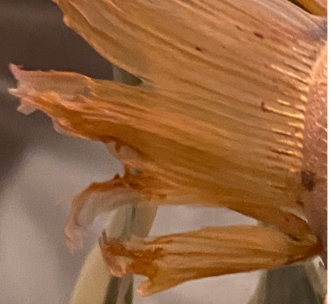 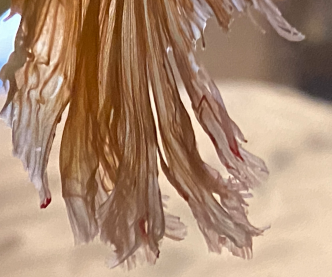 |
|
Questions for 2 Bettas
Hey WWM, I am a super long time reader of 10 years. I love reading thru your
site and have learned a lot since I first came across your site. I have a hobby
of buying sick betta fish on occasion and helping them recover. I have a pretty
good success rate and have helped about 10 recover, but I have 2 I have been
working on who aren't getting better.
<Let's see...>
My first fellow is a double tail I got 2 weeks ago w/ swim bladder issues.
He is constipated and has only pooped a few meager bits since I've had him.
He spends his time floating at the surface, sometimes on his side, and hiding
behind the filter. He does eat and has a normal betta appetite. He isn't really
bloated much. I have fasted him, I have fed him daphnia (which in the past makes
my Bettas poop when they can't go), I have done Epsom salt baths. He gets a
water change every other day due to the tank size.
Nothing is helping. I have only done Epsom salt baths twice. Going thru WWM I
see you suggest instead to add directly to the tank, which I have been hesitant
about because I have seen people warn against that. He is in a 2.5 gal hospital
tank right now. Do you think this would be more beneficial than baths, and how
much should I add, and for how long? Or should I try something else?
<If it were me, mine, I would go ahead w/ the direct addition of Epsom Salt here
(half a tsp. replaced when you change out water), and likely dose w/
Metronidazole and likely Praziquantel... to cover all microbial, parasitic, worm
bases>
My next fish is a Petco-version of a black orchid betta that I got at the end of
the October. He had been there for a while with some nasty fin rot.
In the past I have been able to treat aggressive fin rot with Maracyn and
Maracyn 2. This rot will not go away no matter what I do. I have tried Maracyn,
Kanaplex, daily water changes, Microbe Lift Artemiss, and Methylene blue baths
and swabbing the blue directly on his fins. He hasn't had any antibiotics since
November. The next thing I am trying is Doxycycline from Thomas Labs. Initially
the rot stopped after 2 rounds of Maracyn, but since came back and has only
either slowed, or stopped for a bit and returned. This fish hasn't had any
regrowth. The tail is almost gone and I fear body rot and death. My next step
would be to take him to an actual fish vet, however I can't find one near me who
won't charge over
$200 for the initial visit. He is in a cycled 3 gallon. I do believe the doxy is
going to kill the beneficial bacteria, right?
<Might set nitrifiers back, yes>
Anything else I can do to save him should doxy fail?
<Yes; I would add a good deal (like a couple teaspoons of aquarium salt
(artificial SeaSalt would be better/best) and a pro-rated dose of Metronidazole
here>
Also neither fish has any tank mates. The only other living things in their
tanks is some Marimo moss balls from Aquatic Arts.
<These I'd remove; the salt may work the moss woe>
Thank you for your time and advice!
<Thank you for your efforts. Bob Fenner>
Re: Questions for 2 Bettas
Thank you so much, Bob. I'm going to put some Epsom salt in my constipated boy's
tank today and then look into the other medications. I'm concerned for my boy
with fin rot because yesterday I noticed some fungus or what I think is fungus
on his fins but I tried to stay positive and ignored it and gave him his water
change as usual.
<Aye; w/o sampling (and often culture) it is near impossible to guess what
group of organisms are/may be involved here. And hence effective treatments>
But this morning it has returned and it's probably going to get worse... I'm
really worried that he's not going to make it with the way this fungus is
spreading.
<The salt use should help; at least forestall worsening>
His Doxycycline from Thomas Labs should arrive in the mail today so he will be
started on it when I get home. He does still eat and greets me but spends most
of his time resting on leaves.
<Eating is a very good sign>
I attached a bad pic of him from yesterday where you can see a dot of white
'fungus' on the tiny strand of tail fin in the middle (the tank is acrylic and
water spots won't go away so please ignore that). That little piece of his tail
has since shriveled away. Again thanks for any help!!
<Yeah; the "fungus" could be many things... even just body mucus from...
"irritation".
Do stay positive and keep us in the loop. BobF>
|
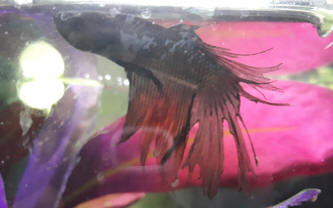 |
|
Re: Questions for 2 Bettas 12/27/19
One last question (or a few) before I play the waiting game with these boys and
their treatments. Thanks for reading thru it all as I like to be very thorough.
<Sure>
How long should I leave the Epsom salt in the aquarium? I do every other day
water changes for him so I should be re-adding whatever amount of salt may be
lost with those changes? I mix the salt in the new water and dissolve before
adding. I usually do a half gallon change since he is in a 2.5 gal.
It has nothing in it aside from a HOB filter, a floating leaf and floating log.
Removed the moss balls since I added the Epsom salt.
<I'd put half a tsp. in this system and replace the percentage removed when you
do water changes>
For the metro and Prazi, I have PraziPro recommended to me a lot and Metroplex
is probably the easiest to get when it comes to that med. Do y'all recommend
both of these?
<Do search/read on WWM re both... these are good, useful medications, but not
items that should be used casually, continuously>
I talk mainly to other aquarists on Facebook and I feel people religiously flock
to Seachem there so I try to remain skeptic with everything.
<Skepticism, even a bit of cynicism I find healthy. Seachem as a co. is "the
real thing". Real products, real science>
For Mr Fin Rot I'm debating removing his current filter when I start the doxy
treatment and keep running it in a small tank and feeding it ammonia so I don't
lose my good bacteria OR putting the media in another aquarium for the moment.
Would the latter be a bad move if the fin rot is contagious?
<I wouldn't feed the system ammonia. The fish will provide plenty. In fact, I
would monitor ammonia and possibly place or filter through Zeolite to remove it>
I have 8 other betta tanks and a cichlid tank going right now.
I can always steal seeded media later too. Thomas Labs recommends a water change
before adding each new treatment of doxy (which would be daily) so I am ok
leaving his tank temporarily without the cycled media that is probably going die
anyway.
<I do agree w/ this regimen. I'd likely treat every three days and do the water
change outs right before then>
Thanks for the help, I really do appreciate it. WWM has been very inspiring and
a tremendous source of info for me all these years.
<Am very glad for this. You and other petfish friends are what we endeavor for.
B>
Re: Questions for 2 bettas 1/9/20
Good evening, here is an update for you. My fin rot betta finished his
doxycycline treatment. He is acting a little more normal and swimming up to
the edge of the tank to meet me and beg for food. Hopefully the rot is done
for. He seems all right, and he is at least feeling more peppy. I am not too
worried about him right now.
<Good. With improved water quality, better nutrition, time going by alone
should see this Betta improving>
My betta with suspected constipation and/or swim bladder issues I am more
concerned about. It has been a few days since I weaned him off epsom salt in
the tank (should I keep him on epsom salt?),
<Not indefinitely, no. I would limit such exposure to no more than a couple
weeks>
and we finished a round of prazipro. While he did have some more regular
poops with epsom salt in his
tank, he remains floating on his side. There is no improvement on swimming
ability. He still spends his day floating and hiding.
<From whatever cause/s (genetic, trauma, pathogenic), he may have suffered
long/er term gas bladder damage>
Recently he has been less reactive to stimulus- an example would be he is
facing a corner and it is feeding time. I nudge him so he knows to move and
he just sits there without moving. He will remain in one spot when other
fish would flee or move. He only eats sometimes. It is probably hard for him
to know it is there, yet even when it is right in front of his face he
ignores it. Other times he goes right for it (he can't exactly swim to his
food- he really just jerks his body a few times and hopes he gets to where
he wants to be).
I make sure to take the time to push the food in front of his face so he can
eat it and remove any he may ignore or sinks to the bottom.
<I'd leave off w/ further chemical treatments here>
I really want to help him but despite all the typical things one would do
for constipation or SBD, he hasn't recovered a bit. I am considering
euthanasia if he doesn't show signs of recovery in a month or so. Surely, a
humane death is better than spending his life floating and hiding and not
being able to live a normal betta life.
<IF it's your perception that this fish/animal in your care is suffering:
http://www.wetwebmedia.com/euthanasia.htm>
Is there something else that could be wrong? Maybe something happened at the
store, at the fish farm, during shipping, etc to cause this.
<Yes; many possible inputs>
When I bought him, he was floating just as he is now. Thanks for all your
help.
<Thank you for your caring, sharing. Bob Fenner>
Re: Questions for 2 bettas 1/20/20
Just writing to tell you I decided to put down my SBD/constipated betta
down earlier than planned. He started to refuse food and was not getting
any better. I knew it would be better to let him go than continue his
life floating and hiding all day. My other guy is doing well, no sign of
any rot returning.
<Thank you for your note. BobF>
Questions for 2 Bettas - follow up, lost my original
email thread 3/15/20
Hello again WWM, I have a follow up question for Bob or whoever
could give input. Back in January I emailed about 2 of my Bettas,
one of which had some nasty fin rot. I don't have the email but the
discussion is "*Questions for 2 Bettas" that is here-
http://www.wetwebmedia.com/BettaHlthF39.htm
<http://www.wetwebmedia.com/BettaHlthF39.htm>*
*The Betta with bad fin rot (his name is Khonsu) went thru another
bout of losing fins, likely to due to some poor water chemistry
since the doxycycline nuked his good bacteria. I corrected water
conditions and stopped the rot pretty fast. He looks absolutely
horrid. He has almost no tail, and has yet to see fin regrowth. My
main concern is he is very skinny. I don't have a good pic of him
but if you imagine the gaunt face of a starving person, that is him.
If you look at him from the front you can see grooves on either side
of his head that shouldn't be there (his skull?). From above he is
almost paper thin. He's been skinny for a few months as well but I
was so caught on his fins I didn't notice as much. He also has swim
bladder issues and has been floating for months. Despite all this,
his energy levels compared to January are outstanding. He is no
longer lethargic. He loves to greet me and swim and do as much
normal Betta activity as he can. When I first emailed WWM, he spent
most of his day sitting on a leaf and rarely swam around. His color
is still good as well- no loss of color at all. He doesn't have any
loss of scales, lesions, bumps, etc.*
*I am concerned more for his skinniness than his fins or SBD
honestly. He has regular poops and isn't bloated at all. His
tummy/underbelly appears concave/sunken in. He eats heartily, twice
a day. I feed New Life Spectrum mainly, and have been raising white
worms for my fish. I feed him no different from my numerous other
Bettas. I have debated parasites with other people but I figured I
would have seen something by now. He was treated in the past with
PraziPro. I haven't medicated him for almost 2
months. I have been letting him live his life since he acts happy,
expecting him to drop dead any day. I'm curious what you believe
this may be and if I should try anything, or just go on as I have
been and leave him alone. I loosely call it 'wasting disease' as I
have no idea at this point.*
*He has me absolutely stumped, in all my years in this hobby I have
never encountered a fish with these issues, let alone for this long
(almost six months). *
<PraziPro, or Praziquantel, isn't an especially reliable
anti-wormer. It's well worth trying something else, such Levamisole,
to see if there's any benefit. In any case, this does indeed sound
more like a type of 'wasting disease' usually attributed to
Mycobacteria, and this is effectively untreatable. Usually such
infections kill fish quickly, but not in all cases, and death may
take weeks or months. His own immune system may be helping to some
extent. The bottom line is that if you've de-wormed, used
antibiotics, and perhaps used an anti-protozoan medication
(Metronidazole is the best choice) there's really not much left
over. Good water quality, vitamin-rich food, plenty of warmth, and
that's about it. Good luck, Neale.>
Re: Questions for 2 Bettas - follow up, lost my original email
thread 3/19/20
Thanks for the input on it possibly being Mycobacterium. I did some
more research with the actual scientific name instead of 'fish TB'
and it is adding up more.
<Yep. But we tend to avoid the Fish TB term because it technically
belongs to a single Mycobacterium species, Mycobacterium marinum,
and more specifically, once the Mycobacterium has crossed the
species boundary and infected a human. But yes, the name Fish TB is
widely used, though rarely by vets.>
Do you happen to know anywhere that I could test him post mortem?
<Not where I am, in England, at least. If there's a local university
with a fish biology or microbiology department, that's perhaps your
best bet, especially if there's a scientist working on this sort of
pathogen.
Otherwise, you could ask a vet, but I wouldn't get your hopes up.>
I'd be interested in results. I have considered a fish vet for him
as well but around here, the prices are a little wild. At this point
I am content to let him live as he is since he is peppy enough.
<What I'd do, too, until there were signs of distress.>
Thanks for everything.
<Most welcome. Neale.>
Re: Questions for 2 Bettas - follow up, lost my original
email thread 3/29/20
Good morning WWM, so I have a really bizarre update on this Betta.
In the last week he has taken a turn for the better!
<Yay!>
His fins are growing back and his swim bladder problems (floating at
the surface for him) are gone.
<Nice.>
This has happened over the past week. This morning I woke up and he
is swimming at all levels of the tank like normal. I'm bewildered
because I never expected a recovery, let alone something this fast.
He is still very skinny so I am hoping if he is getting better, I
can get some weight on him. If the mycobacterium suspicion was
correct, is this sort of recovery even "possible" or maybe it isn't
mycobacterium after all?
<Yes, though rare. There's no treatment for Mycobacteria infections,
but some fish do indeed recover. Perhaps more likely some other
problem, bacterial or otherwise, was at work. Constipation and
exposure to airborne toxins are two such examples of things that can
cause acute problems followed by spontaneous recovery. >
I just can't wrap my head around this sudden recovery.
<Stranger things have happened! Cheers, Neale.>
|
|
911 Betta Help 12/11/19
Hello WWM Crew,
Background:
20 gallon tall tank
<Mmm; Betta's are better kept in shallower/less deep systems... it's a haul to
make it to the surface to grab gulps of air>
Filtered and heated
CO2 day —airstone at night
<Ahh!>
Planted
Stock: albino bristle nosed Pleco, 2 adfs, 1 mystery snail, 1 Amano shrimp, half
moon dragon scale betta, sword tail
My betta has always had fin rot ever since I got him almost a year ago.
<? Unusual... are you sure this appearance is not some type of coloration of the
fins?>
I have been able to keep it under control and keep it from progressing and had
it come and go. Never had regrowth I think but never done any treatments. Only
water changes every week and prime.
<This sounds like (it should be) a fine set up, maintenance program>
Last week I got my tank back in order after letting it go for two weeks where I
didn’t do water changes and run my CO2. I had my parameters fail and an algae
outbreak. Now that is cleaned up and my parameters are stable
again. I fed everything but did not really pay attention to how everything
looked. After I realized my Bettas fins were destroyed and he had a white spot
on his fins.
<"A" as in a single spot I take it>
I quarantined him in a one gallon and did daily 50% water changes for a week
with BettaFix.
<Not a fan of this API product, nor Melaleuca for medicine period>
Things are not looking better and the white spot has grown. It’s not fuzzy just
white. His right eye is bulging and when taking pics I noticed his scales are a
golden shiny color. It’s not dusted but solid except for on his lower fin below
his body where it is dusted looking. His fins are shredded and crumpled down.
<... could this fish, system be infested w/ Velvet, Amyloodinium?>
After noticing this I couldn’t tell if it was velvet so I looked at the
swordtail which I added two months ago. He didn’t look like this when I got him
but is now covered in a dusting of gold shiny metallic. It was really hard to
get a picture of as he is constantly moving and the flash light has to reflect
on it just right. He is black with a blue hue in the right light and a metallic
silver eye normally. But now there is gold all over him in the right light you
see it.
<I would treat for Velvet>
First I want to address the betta. I think he has multiple problems, I’m not
sure what, I don’t know what to use to treat them, or in what order. It could be
bacterial, fungal, Velvet. He has the white spot, bulging right eye, and
shredded fins. He wants to live I can tell and is trying to hang in there. He is
eating again but wasn’t for the first few days of quarantine. He needs to be
medicated at this point and I think I need to make it the right moves or it will
progress to far before I can get to it.
<I would return this fish to the 20 (more stable) and treat all for (just)
Velvet for now... there are a few approaches; from depriving light to less-than
discriminate dyes and metal solutions. You may well have to remove the snails,
frogs to elsewhere, perhaps your plants (and run them through a dip/bath to
remove the Dinoflagellates on returning)>
Please give me your insight with what you think all he has and what medicine as
well as brand names to use.
<I'd have you search, read re "Velvet" (for freshwater) of WWM, esp. reviewing
this list of medications by Neale Monks:
http://www.wetwebmedia.com/FWSubWebIndex/fwfishmeds.htm
AND carefully pre- and re-reading the manufacturers information on use>
Pics below include:
Both tanks
<Both? You mention one, and a bowl for treatment. You provide an image of the
tank... am not a fan of round/smooth pebbles as substrate... Is the filter here
keeping ammonia, nitrite at 0.0 ppm? Nitrate under 20 ppm?>
Betta a month ago at his maintained fin rot state
<I see this>
Betta now with gold coloring on scales and dusting in lower fin
<Can't make out the gold dusting>
White spot on tail fin 7 days ago when moved into quarantine And it now Bulging
eye
<Okay; seen>
Sword tail gold dusting
<Again, not discernible (by me). Am going to ask Neale here to review all,
present his own response. Bob Fenner>
|
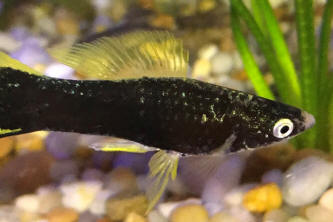 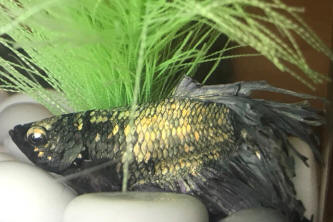
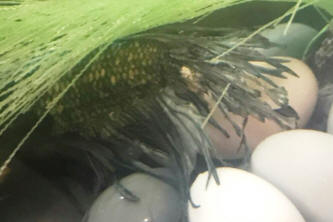 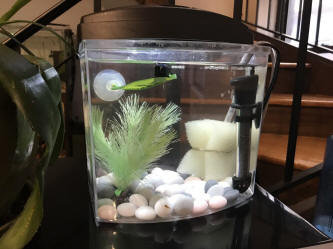
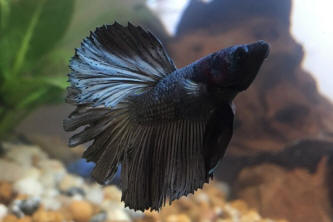 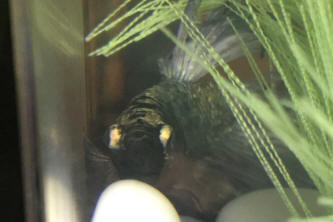 |
|
911 Betta Help /Neale
<<It is not obvious to me that the Swordtail is sick at all. Velvet is
usually quite obvious (think: icing sugar) and infected fish almost always
'flash' (move rapidly) against rocks as if trying to scratch themselves.
Heavy ventilation of the gill covers is usually obvious too, because Velvet
infects the gills almost before anything else. Swordtails are moderately
demanding by community tank standards: they are active swimmers, so a tank
at least 2.5 ft, and ideally 3+ feet in length is surely essential. They despise
high temperatures, so best kept around 22-25 C (72-77 F) but no higher. Hard,
alkaline water is essential. Like other livebearers, they're sensitive to 'old'
water and prone to mysterious ailments, such as wasting away, in stuffy or
overstocked tanks. Your Betta just looks like a specimen with indifferent
genetics. Colouration is normal enough, just not uniform, and the raggedy edges
seem to be genetic, rather than the result of Finrot (which would tend to expose
fin rays that look like fine bones, as well as patches of white dead tissue and
pinkish, inflamed areas). I don't see obvious eye bulging, but if it's just the
one eye, that's most likely caused by an injury, and should go down by itself.
The use of Epsom Salt
can help to reduce swelling. A dose of 1-3 teaspoons per 5 gallons/20 litres
will do the trick. Note that Epsom Salt isn't the same thing as tonic, table,
sea or cooking salt. It can be purchased inexpensively online or via drugstores.
As for treating Velvet, commercial medications such as eSHa EXIT will do the
trick, but with livebearers, if they're all you're keeping, adding salt at a
dose of 2-5 gram/litre will do the job with less risk of stress. Indeed, marine
salt mix added to livebearer tanks has a mild tonic effect on these fish, even
the true freshwater ones like Swordtails, and can be used for some weeks without
risk. Cheers, Neale.>>
|
|
Constipated Betta 4/5/19
Hi Crew!
<Hello again!>
I’m having a problem with Chester again. The problem he had with his
open Gil in February has been resolved and has been doing great until
the last few weeks.
<Good to know.>
Chester became constipated because I over fed him. I fed him a variety
of foods i.e.. Shrimp, bloodworms, pellets one time a day, but now I
know I fed too much at a time.
<Understood.>
I keep him in a 5 gallon, heated, filtered, lightly planted, bare bottom
tank so I can see when he’s pooped.
The tank has been set up since 1/24/19. Since 3/15 he has been having
the constipation problems. On 3/17 I added Epsom salt to his tank, which
I left in the tank until I did A water change on 3/20. Since then I had
fasted him a couple days and he’s pooped a few times. Over the last week
I started feeding shrimp or pellets one day and frozen Daphnia the next.
When ever I fed the Daphnia he would poop the next day, but would not
poop on the other foods.
<Daphnia are a 'high fibre' food of sorts because of their tiny shells.
Definitely worth offering on a regular basis to any small fish. Brine
shrimp work well, too.>
Now he last pooped on this past Saturday 3/30 and I last fed him Daphnia
On Sunday 3/31. So here we are. Now he’s not even pooping after the
Daphnia and he hasn’t eaten for three days.
<Patience...>
I’m not sure what I should do next. Seems like fasting alone never makes
him poop. Don’t know if I should add more Epsom salt. If so how much and
how long.
<1-3 teaspoons per 5 gallons/20 litres; use indefinitely. Remember when
doing water changes to replace the Epsom Salt on a per bucket basis!>
If I should fast him longer.
<A few days is fine, but once using Epsom salt, things should get moving
quickly.>
I have Anubias in his tank too. Also I want to transfer him to a 10
gallon, as in my opinion the water chemistry is not that stable in a 5
gallon.
<Agreed.>
I’ve lost the cycle a couple times. I’ve always kept Bettas in 10
gallon. Should I wait?
<Can't think why.>
I don’t want to stress him even more. I just added the plants to the
tank 3/15 cause his fins had torn on the plastic plants. But all healed
quickly though. So he’s gone through changes.
<Bettas are pretty adaptable fish. I'd change the tank, but put all the
old tank's water in it, and then add new water, so any water chemistry
changes are minimal.>
He’s swimming around fine and always exploring and begging for food. He
never had swim bladder problems. He is just a little bloated in front of
his ventrals.
I appreciate your help.
Thanks
Donetta
<Hope this helps, Neale.>
Re: Constipated Betta 5/27/19
Hi again, I’m sending an email on this previous email so you can see the history
of my communications with you. Let me know if I should start a new email for the
future.
<Either way suits. A quick recap in a sentence or two might be faster though!>
Chester’s constipation is better.
<Good.>
I still add the 1/4 tsp of Epsom salt per gallon. If I feed more than two Brine
shrimp at a time he won’t poop by the next day. So literally I’m feeding once
per day two Brine shrimp, two bloodworms or Mysis shrimp and Daphnia once per
week. All frozen food.
<Sounds good.>
He can’t tolerate pellets.
<No great loss, but if you're using frozen foods and no flake/pellet foods,
dosing with vitamins is wise. Certainly, aim for as great a variety as
possible.>
I use Harari Frozen food and the protein % is low at 6.9% for Spirilina Brine
shrimp. Is this ok? Is this enough food?
<The low protein level isn't a problem. We feed fish far more protein than they
need (much as we do when feeding ourselves) but lack of greens in their diet can
mean vitamins are lacking. Flake and pellets have these added, but generally
live and frozen foods do no.>
Do I have any other options?
<See above; vitamins are available, such as Selcon, and these will help out.>
I don’t see any other options or he’ll get constipated. His colors aren’t as
vibrant as they use to be.
<Again, vitamins in the form of beta carotene are crucial to how fish make red
colour pigment. Crustaceans are a good source, including brine shrimp; you can
also try using needle nose forceps to offer tiny bits of prawn or shrimp. Fish
will often take from these forceps because they are less threatening than
fingers.>
In addition, he seems to be loosing scales on his face at the top of his head
and on both sides of his face and under his chin area. The green coloring is
gone under his chin.
He’s alone in a 10 gallon, planted, filtered, heated to 80 degrees, bare bottom
tank. Fully cycled I clean the tank every week. He’s swimming around fine, but I
do notice that he breathes heavily at times. His gills really move. However the
Ammonia is zero.After I clean his tank, debris seems to settle on top of the
water. I have two filters on both ends of the tank with the outlet pointed at
the glass. The day or two after water changes I skim the top of the water.
I appreciate you giving me advice.
Thanks!
<Most welcome. Neale.>
|
.jpeg)
 |
|
Re: Constipated Betta 6/10/19
Hi again,
<Donetta>
I’m not sure what else I can do about my Betta Chester’s constipation. He’s a
lone fish in a 10 gal, heated, filtered, planted, bare bottom tank. I feed him
only frozen foods now because that’s all he can tolerate.
<... have you considered a modicum of Epsom Salt?>
His constipation started with overfeeding that I’ve since corrected. At this
sites suggestion I added and keep 1/4tsp Epsom salt per gallon to the water
beginning 4/20/19. I feed literally 2 Brine Shrimp, 2 Mysis
Shrimp, 2 bloodworms or Daphnia. For Daphnia I defrost it pour on a napkin.
Scrap a small portion up with a spoon and roll it in a tiny ball the size of a
pellet. In addition I now add vitamins to his food at your suggestion. I was
feeding this once per day. Sometimes he still wouldn’t poop by the next day, I
have a bare bottom tank and see everything , so I started feeding him this
amount every other day. In addition I bumped up the Epsom salt to .5 tsp per
gallon on 5/30 which was 10 days ago.
<Ah, good. I might even try a higher concentration of MgSO4 as a bath...
temporary immersion (like a minute). Freshwater fishes, unlike marine, don't
drink their environment to a great extent>
Well he pooped yesterday and this morning it was gone. So my conclusion is that
he ate it.
<Ahh!>
I know it did not dissolve over time, cause I know what that looks like. Makes
me wonder if he’s done this before or is he just so hungry with the small amount
of food that he’s been given and it’s the first time.
I don’t know what I should do. I appreciate all the help.
Thanks
Donetta
<I would stay the course you're on for now. Read up re the concentrated salt
dip. Bob Fenner>
|
Re: Constipated Betta 7/10/19
Hi it’s Donetta again,
<Hello Donetta,>
Needing more help with my Betta Chester. He’s a lone fish in a 10 gal, heated,
filtered, planted, bare bottom tank.
<All sounds fine.>
I gave him the concentrated Epsom salt bath on Thursday’s suggested. I’m feeding
him a variety of frozen food with the added vitamins every other day and he has
BMs every other day. He’s not bloated, but he was starting to float with his
tail raising up so I gave him the bath. The floating went away by the next day.
<That's good.>
In addition, he tore three of his fins on his Anubias plant roots.
<Seems deeply unlikely. Anubias aren't sharp, and the roots curl around rocks,
so he'd need be doing something real peculiar. More to the point, fish fins are
slippery, and don't easily catch in anything much.>
They didn’t heal up, but developed a little rotting.
<Which underlines the reality that some sort of Finrot or equivalent
opportunistic infection is at work here. Damaged fins aren't a problem for
healthy fish in clean water -- they heal with little more difficulty than your
hair grows back after a trim.>
He tore them in May. I added stress coat to the water, but they still didn’t
heal.
<Stress Coat is one of these products sold to aquarists that sounds like it's
magic -- and that's always a good sign you're looking at marketing rather than
science! It's a good water conditioner. Buy beyond that, stuff about aloe vera
and so forth really doesn't mean much. What you need when dealing with Finrot is
an antibacterial or antibiotic. In the US, antibiotics can be purchased in pet
shops, for example Maracyn II and Kanaplex, while outside of the US you're need
a prescription for equivalent products. So outside the US we tend to use
reliable antibacterials, my favourite being eSHa 2000, but Waterlife Myxazin is
another popular choice. Basically, avoid anything that sounds like a cheap
cure-all: salt, tea-tree oil, aloe vera, etc.>
On Saturday I moved him to a small 1.5 gallon tank so I could do daily water
changes with added salt to help him heal.
<Salt is irrelevant here.>
Once in this small tank I really got to see his faded colors.
<I bet.>
I don’t think I’m feeding him enough with only 2 Brine shrimp, 2 blood worms or
2 Mysis shrimp every other day, but if I feed two days in a row he won’t have a
BM the next day. He didn’t have a BM after the Epsom bath. I don’t think it’s
anything else in there. He use to have a BM everyday. Is it ok for him to have a
BM every other day?
<What's a BM?>
His fins looks somewhat translucent and He seems really skinny and week even
with the added vitamins.
<See above re: treating bacterial infections.>
So I put him in the 1.5 gal on Saturday and started doing daily 75% water
changes with 1.5 teaspoons salt per gallon the heal his fins.
<Salt doesn't heal fins. It has some value as a treatment against Whitespot when
used at 2 gram per litre, but beyond that, the addition of salt is one of those
cheap-but-useless things that won't do much.>
This worked well with another Betta I had and his fins healed in a week.
<I doubt the salt is why he got better. As stated above, a healthy fish will
heal its fins back without problems. It's the equivalent of your skin healing
over a cut.>
Well Chester was very lethargic on Saturday. He crashed at the bottom of the
tank some. Then Monday he was better almost like his normal self. Then this
morning he has clamped fins, yawning and darting some around the tank. Maybe he
has a parasite. He yawns in the main tank sometimes too. I’ve done daily water
changes on Saturday, Sunday and Monday so the water is clean.
<Good stuff. But do check ammonia and nitrite levels -- if these aren't zero,
Finrot is a common symptom of the stress they cause. Goes without saying that
non-zero ammonia and nitrite will slow down, even reverse, healing.>
I was thinking When I change the water tonight that I should remove the salt.
<Adding salt at trivial levels (i.e., below 2 gram/litre) does nothing much, so
I'd discontinue this.>
After that I don’t know what to do.
<See above.>
I was thinking about using the Paraguard I have since his fins have not healed
after two months. That medicine covers parasites, bacterial, fungus and virus
infections.
<Paraguard is not an antibiotic, but it is a fairly reliable antibacterial
(antimicrobial, even). So much better than salt and wishful thinking! It's not
going to turn around a severe infection, but I think it's definitely worth a
shot here. If your fish is still active and eating, there's a good chance he can
recover.>
Here’s a picture with his tore fins, however his color looks good in the
picture. He is definitely more pale and frail looking in person. However he has
splits/ tears on every fin and it’s getting worse.
Thanks again
Donetta
<Hope this helps. Cheers, Neale.>
|
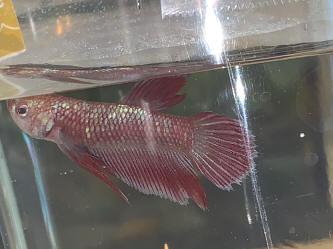 |
|
Betta open Gill cover 2/8/19
Good morning Y’all! I’m Donetta and back with a new Betta named Chester!
<Donetta with a Betta called Chester sounds like a Marx Brothers song!>
I set my tank up two weeks ago on 1/24/19. He’s a lone fish in a 5 gal,
heater, filtered tank with a plastic plant. I cycled his tank with Tetra
safe start which cycled in three days as always showing 0 Amm, 0 Nitrite
and 10 nitrate.
<All good.>
Chester is a hmpk and super aggressive and has flared tremendously at
his shadow for the past two weeks. I started turning on the light about
four days ago for 4-5 hours per day trying to get him use to it. He
seems like he is settling down a little bit. I also put Indian Almond
extract that I make to help him feel more comfy. I also feed his a
variety of foods i.e. pellets, Brine shrimp, bloodworms, and Mysis
shrimp.
<Good.>
Last night I came home and noticed one of his Gill covers is a little
open and flared out. He eases up to the glass and places the Gill on it
ever so lightly to try and rub it. It’s not like flashing, put it’s
definitely bothering him. Besides that he is eating and swimming
normally. He blows huge bubble nests! Moving around very actively and
lots of aggressive posturing. He it stressed by those shadows. I put on
an aquarium background with plants and rocks to try and break up the
shadows. It helps some, but I figure he just needs more time to adjust.
<Perhaps.>
I had to wait two weeks to clean his tank with the Tetra Safe Start. I
decided to go ahead and clean the tank last night ( 1 day early) after I
saw the open Gill cover. I went to clean the tank and had a problem with
getting my siphon started. This kicked up all this debris. I couldn’t
believe how much debris I saw. The brown poo I understood, but there was
the white floating debris too and lots of it. I was confused. I never
cleaned a Betta tank with this much debris.
<Is there a lot of (live) plants in here? Did you use Indian Almond
leaves or similar? Both can/will decay to produce organic mulm. Not in
itself dangerous -- indeed, it plays host to useful bacteria -- but too
much can clog up filter inlets, compromising water quality. Regardless,
any organic debris that settles in the tank does indicate insufficient
mechanical filtration. Again, some fish don't need or water a lot of
water turnover, which means that debris collects in their aquarium
because it isn't sucked into the filter. But if you want a debris-free
substrate, increasing mechanical filtration is the key, perhaps
alongside more frequent water changes to siphon out debris.>
I did have an incident with the Mysis shrimp. It was the first time I
used that food. I believe some of it fell to the bottom. It’s white so
it was hard to see, no way did I think it could be that much. I ended up
changing 80% of the water. I know this is a no no, but I just couldn’t
leave all that gunk in the tank.
<Changing that much water is absolutely fine so long as water chemistry
and water temperature aren't dramatically altered. After all, to
paraphrase a Greek philosopher, a wild fish doesn't swim in the same
river twice! They're constantly exposed to new water at varying rates,
and to some degree, can adapt to slight changes without too much bother.
On the other hand, cleaning the filter out too severely, which can get
rid of the bacteria, is a no-no, but the water itself isn't a problem.>
I still think there is plenty more, but with my siphon issue I couldn’t
clean properly. The tank is bare bottom so all this stuff was floating
in the water column. I’m getting a new siphon today. Anyway when I
changed the water I put in stress coat in hopes to soothe his Gill,
Indian almond leaves extract. I also added a probiotic called Eco
balance that I’ve wanted to use.
<Cool.>
I read that his Gill Problem could be bacterial.
<It can be, but is more often environmental. Most often happens when
fish are exposed to high ammonia or nitrate, or cramped conditions, and
perhaps high nitrate and low oxygen levels. So while some parasites can
damage the gill lamellae, notably Velvet, I'd be looking at
environmental causes first.>
The open cover happen in the span of 14 hours. I have Kanaplex at home,
but I didn’t want to jump to that. If this can heal with clean water I’d
rather just do that.
<This would be my approach, yes.>
I checked his water param.s before I did his water change and I had 0 Am
and looked like 20ppm Nitrate. I purchased him from Petco. He looked and
behaved normally, however for curiosity I tested the water in his cup he
came in and the water was very dark green. It was 4 or 8ppm. Maybe this
is affecting his Gills too.
<4-8 ppm nitrate is trivially low, so unlikely a stress factor. On the
other hand, virtually no urban domestic water supply I'm aware of has
nitrate that low, so unless you're using spring water or something, I'd
be suspicious of any test kit that registers the nitrate this low.>
Glad y’all are here as always, this is my 5th Betta and I’ve inquired
here about three of them. I remember Bob told me read the facts and I
did. I’ve read over 90% of all of them!
<Cool.>
Thanks Bob!
<I've cc'ed him.>
Thank you!
Donetta
<Cheers, Neale.>
Re: Betta open Gill cover (RMF, alternative views?)
2/9/19
Good morning Neal! Thanks for responding.
<Welcome.>
Glad to know the problem is probably more likely environmental. To
clarify, I tested the cup water that I purchased Chester (got to look up
the Marx Brothers :) in it was the Ammonia that was 4-8ppm not nitrate.
It was terrible.
<Got you now. 4-8 ppm ammonia would stress, probably kill most fish
quickly.>
When I got home, Chester’s Gill was still sticking out, but now I see
laboring in his breathing now. He’s slowing down. He swims around, but
taking breaks to rest on leaves now and then. I added 1 TBS of Aquarium
salt to the 5 gallons. I hope he pulls through.
<As do I; I would perhaps stick with optimal living conditions rather
than medicating. Curled gill covers often don't return to normal
(especially with bigger fish) but in themselves don't adversely affect
the fish in question.>
Donetta
<Cheers, Neale.>
Re: Betta open Gill cover (RMF, alternative views?)
2/9/19
Sorry I realized I missed something! No I have a fake plant with lots of
leaves. I didn’t put in an Indian almond leaf, I made an extract first
by soaking it in hot water. Then pouring in the liquid.
Thanks again
<Understood. The muck is coming from something, perhaps uneaten food as
you suggested. Stirring the substrate and siphoning the muck out would
be useful. A turkey baster makes a great spot-cleaning tool if that's
not practical. Cheers, Neale.>
Re: Betta open Gill cover (RMF, alternative views?)<<Let's see>>
2/9/19
Good morning Y’all! I’m Donetta and back with a new Betta named Chester!
<Donetta with a Betta called Chester sounds like a Marx Brothers song!>
<<"Wanna buy a duck?">>
I set my tank up two weeks ago on 1/24/19. He’s a lone fish in a 5 gal,
heater, filtered tank with a plastic plant. I cycled his tank with Tetra
safe start which cycled in three days as always showing 0 Amm, 0 Nitrite
and 10 nitrate.
<All good.>
Chester is a hmpk and super aggressive and has flared tremendously at
his shadow for the past two weeks. I started turning on the light about
four days ago for 4-5 hours per day trying to get him use to it. He
seems like he is settling down a little bit. I also put Indian Almond
extract that I make to help him feel more comfy. I also feed his a
variety of foods i.e. pellets, Brine shrimp, bloodworms, and Mysis
shrimp.
<Good.>
Last night I came home and noticed one of his Gill covers is a little
open and flared out. He eases up to the glass and places the Gill on it
ever so lightly to try and rub it. It’s not like flashing, put it’s
definitely bothering him. Besides that he is eating and swimming
normally. He blows huge bubble nests! Moving around very actively and
lots of aggressive posturing. He it stressed by those shadows. I put on
an aquarium background with plants and rocks to try and break up the
shadows. It helps some, but I figure he just needs more time to adjust.
<Perhaps.>
I had to wait two weeks to clean his tank with the Tetra Safe Start. I
decided to go ahead and clean the tank last night ( 1 day early) after I
saw the open Gill cover. I went to clean the tank and had a problem with
getting my siphon started. This kicked up all this debris. I couldn’t
believe how much debris I saw. The brown poo I understood, but there was
the white floating debris too and lots of it. I was confused. I never
cleaned a Betta tank with this much debris.
<Is there a lot of (live) plants in here? Did you use Indian Almond
leaves or similar? Both can/will decay to produce organic mulm. Not in
itself dangerous -- indeed, it plays host to useful bacteria -- but too
much can clog up filter inlets, compromising water quality. Regardless,
any organic debris that settles in the tank does indicate insufficient
mechanical filtration. Again, some fish don't need or water a lot of
water turnover, which means that debris collects in their aquarium
because it isn't sucked into the filter. But if you want a debris-free
substrate, increasing mechanical filtration is the key, perhaps
alongside more frequent water changes to siphon out debris.>
I did have an incident with the Mysis shrimp. It was the first time I
used that food. I believe some of it fell to the bottom. It’s white so
it was hard to see, no way did I think it could be that much. I ended up
changing 80% of the water. I know this is a no no, but I just couldn’t
leave all that gunk in the tank.
<Changing that much water is absolutely fine so long as water chemistry
and water temperature aren't dramatically altered. After all, to
paraphrase a Greek philosopher, a wild fish doesn't swim in the same
river twice! They're constantly exposed to new water at varying rates,
and to some degree, can adapt to slight changes without too much bother.
On the other hand, cleaning the filter out too severely, which can get
rid of the bacteria, is a no-no, but the water itself isn't a problem.>
I still think there is plenty more, but with my siphon issue I couldn’t
clean properly. The tank is bare bottom so all this stuff was floating
in the water column. I’m getting a new siphon today. Anyway when I
changed the water I put in stress coat in hopes to soothe his Gill,
Indian almond leaves extract. I also added a probiotic called Eco
balance that I’ve wanted to use.
<Cool.>
I read that his Gill Problem could be bacterial.
<It can be, but is more often environmental. Most often happens when
fish are exposed to high ammonia or nitrate, or cramped conditions, and
perhaps high nitrate and low oxygen levels. So while some parasites can
damage the gill lamellae, notably Velvet, I'd be looking at
environmental causes first.>
The open cover happen in the span of 14 hours. I have Kanaplex at home,
but I didn’t want to jump to that. If this can heal with clean water I’d
rather just do that.
<This would be my approach, yes.>
I checked his water param.s before I did his water change and I had 0 Am
and looked like 20ppm Nitrate. I purchased him from Petco. He looked and
behaved normally, however for curiosity I tested the water in his cup he
came in and the water was very dark green. It was 4 or 8ppm. Maybe this
is affecting his Gills too.
<4-8 ppm nitrate is trivially low, so unlikely a stress factor. On the
other hand, virtually no urban domestic water supply I'm aware of has
nitrate that low, so unless you're using spring water or something, I'd
be suspicious of any test kit that registers the nitrate this low.>
Glad y’all are here as always, this is my 5th Betta and I’ve inquired
here about three of them. I remember Bob told me read the facts and I
did. I’ve read over 90% of all of them!
<Cool.>
Thanks Bob!
<I've cc'ed him.>
Thank you!
Donetta
<Cheers, Neale.>
<<I concur w/ Neale's usual stellar input here. BobF>>
Re: Betta open Gill cover (RMF, alternative views?)
2/9/19
Alternative views, WOW I didn’t know y’all did that!
You guys are the best!!
<We have our moments!>
Thanks
Donetta
<Most welcome. Neale.>
 |
Betta Success
Doing what it takes to keep Bettas healthy long-term
by Robert (Bob) Fenner
|
|
|

